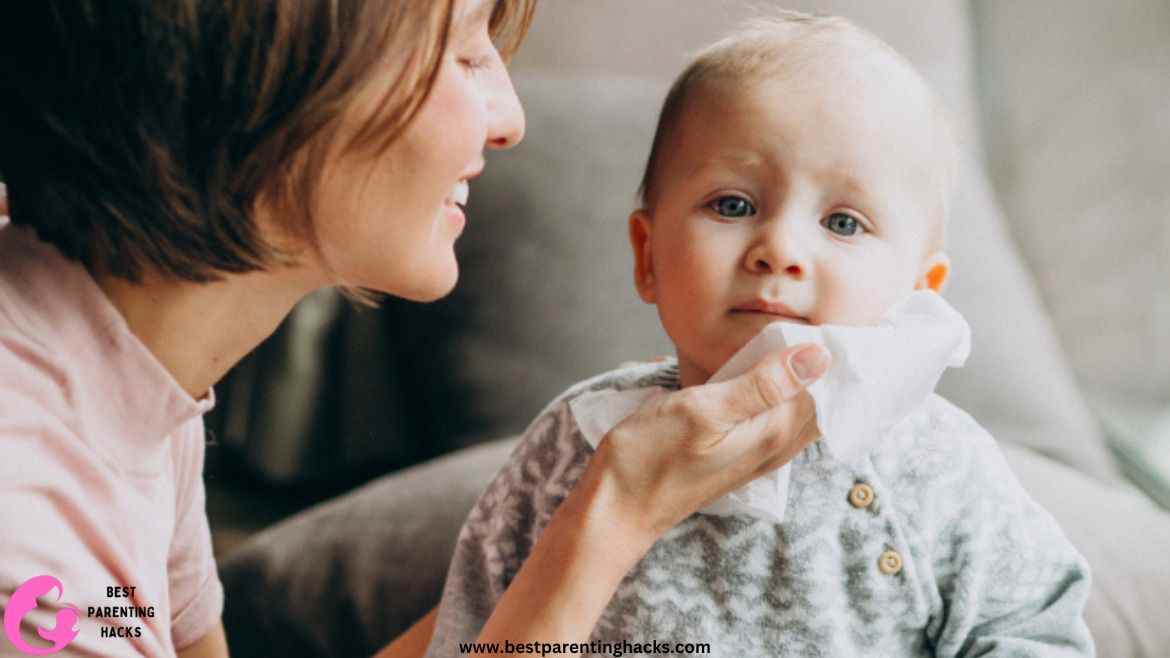Table of Contents
I have perceived my child to grow as a mother through different phases, each with its unique challenges and excitements. Managing our children’s inclination to put everything in their mouths, including baby wipes, is one such difficulty that many parents can identify with. Despite its apparent innocuousness, this activity raises questions regarding health and safety. Due to their innate curiosity, babies frequently taste and chew on anything they come across throughout their exploration. This period is crucial to their sensory and motor development; consequently, we are obliged to be careful about what they eat.
The urgent query, “Is it okay if my baby chews on baby wipes?” is addressed here. The simple answer is no. Although they are an essential part of our everyday childcare routine, baby wipes are not meant to meet the mouth. Even while baby wipes’ chemicals are usually safe to use externally, eating them might be dangerous. This paper aims to explore the reasons behind behavior the risks involved, and practical approaches for parents to manage this phase safely and effectively.
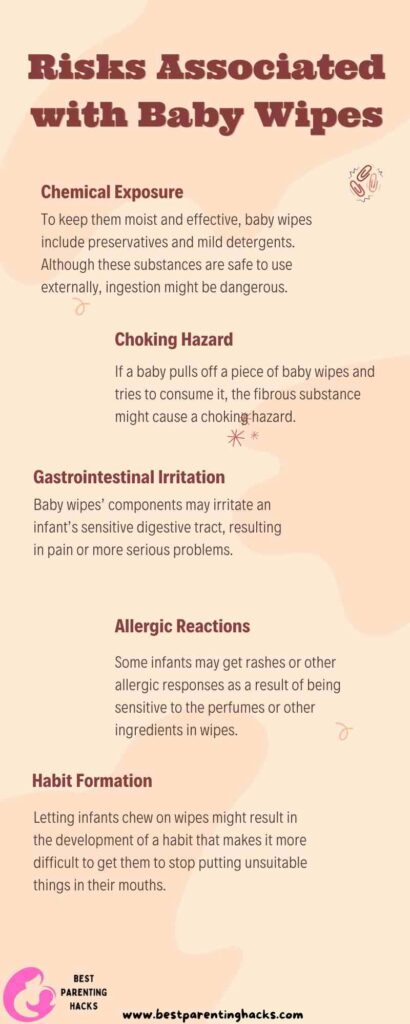
Risks Associated with Baby Wipes
Although every parent’s supply of baby wipes is an essential item, there is a chance that a baby will gnaw on them. Here are five things to think about:
1. Chemical Exposure: To keep them moist and effective, baby wipes include preservatives and mild detergents. Although these substances are safe to use externally, ingestion might be dangerous.
2. Choking Hazard: If a baby pulls off a piece of baby wipes and tries to consume it, the fibrous substance might cause a choking hazard.
3. Gastrointestinal Irritation: Baby wipes’ components may irritate an infant’s sensitive digestive tract, resulting in pain or more serious problems.
4. Allergic Reactions: Some infants may get rashes or other allergic responses as a result of being sensitive to the perfumes or other ingredients in wipes.
5. Habit Formation: Letting infants chew on wipes might result in the development of a habit that makes it more difficult to get them to stop putting unsuitable things in their mouths.
You Might Also Like to Read: Can Frozen Breast Milk Upset Baby’s Tummy?
Understanding Baby’s Mouthing Phase
A baby’s mouth period is a normal and crucial stage of development. It usually begins when the child is four months old and can continue until the child is two or three years old. The ability of a youngster to move objects using his or her hands is crucial during this stage. Through touching, tasting, and chewing on items, babies discover things about their surroundings. Additionally, children’s understanding of different flavors, textures, or temperatures can be attributed to exploration through the senses which also supports their cognitive growth.
However, parents need to exercise additional caution at this age as well. Here are four important factors to think about:
1. Sensory Exploration: Infants use their tongues to investigate the world around them. This investigation is an essential component of their sensory development, not merely a means of sating curiosity.
2. Teething: Babies start to experience discomfort and an increased desire to chew on items to relieve gum irritation at six months of age.
3. Motor Skill Development: As newborns learn to grip and handle various objects, they are also developing their fine motor abilities through the act of mouthing objects.
4. Immune System Boost: A baby’s immune system can be strengthened by exposure to a variety of chemicals. That being said, not every item can be mouthed.
You Might Also Like to Read: I Accidentally Gave My Baby Honey Nut Cheerios. What Should I Do?
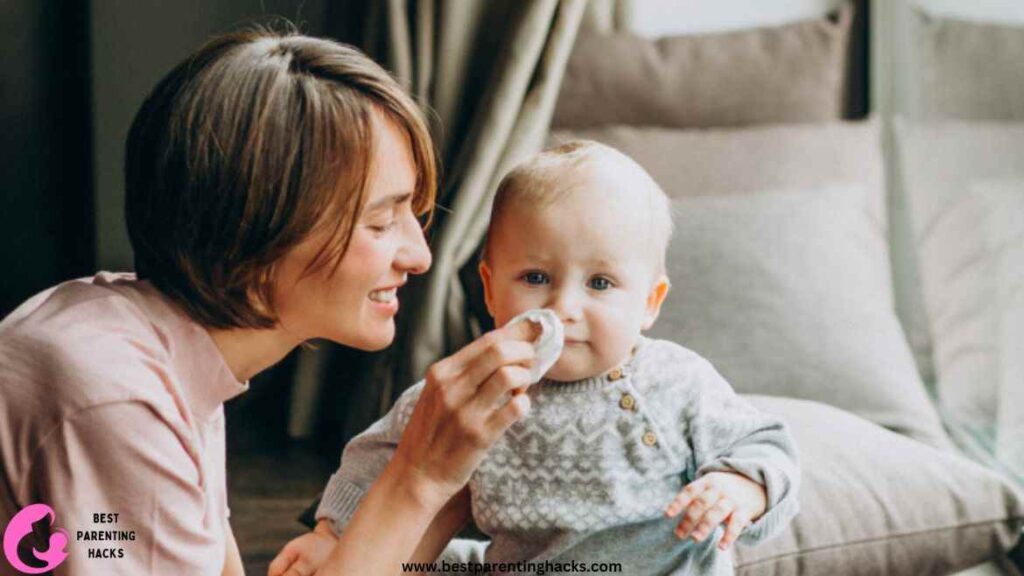
Expert Opinions on Baby Wipes
In general, pediatricians and childcare specialists advise against letting infants chew on baby wipes. Here are five explanations for this:
1. Ingestion of Chemicals: Although the chemicals in wipes are small, experts caution that they should not be consumed since they may be hazardous.
2. Risk of Choking: The actual composition of wipes presents a choking hazard, particularly for infants who may not be able to chew their food correctly.
3. Dermatological Concerns: Wipes’ components may irritate delicate skin or result in rashes in certain newborns.
4. Oral Health: A baby’s teeth and gums may suffer if they are exposed to the chemicals in wipes for an extended period.
5. Behavioral Patterns: Professionals stress the significance of preventing routines that may result in dangerous actions, such as biting on objects that aren’t food.
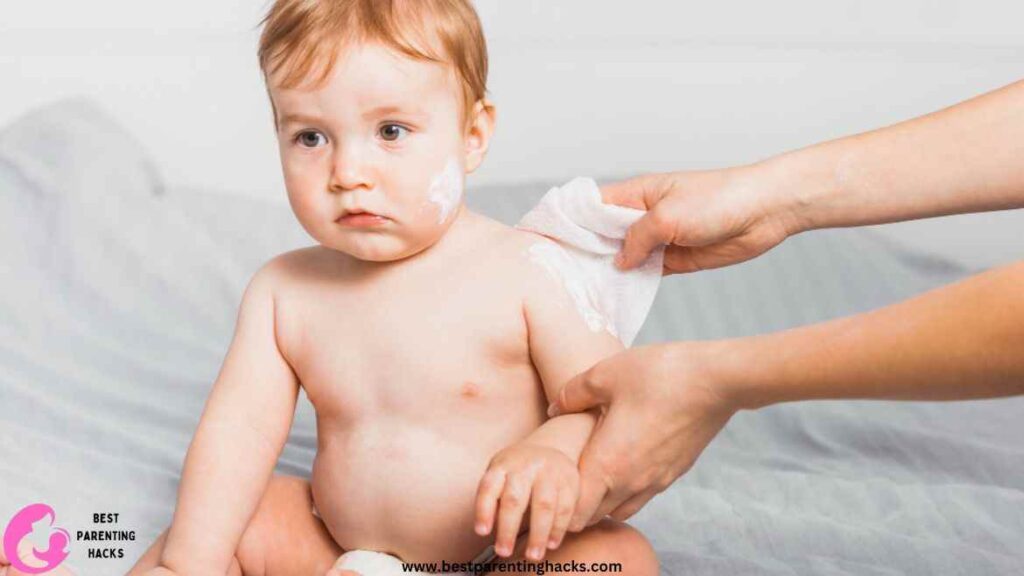
Safer Alternatives to Baby Wipes
In light of the dangers connected to conventional baby wipes, here are four safer substitutes:
1. Natural and Organic Wipes: Wipes with more natural components and fewer chemicals are available from companies like The Honest Co. and Water-Wipes.
2. Homemade Wipes: Using organic components like coconut oil and essential oils, parents may create their own wipes, which is a safer choice for infants.
3. Reusable Cloth Wipes: Using clean, soft cloths as wipes can be a secure and environmentally responsible substitute.
4. Fragrance-Free and Hypoallergenic Wipes: These wipes help lower the chance of allergic responses in infants with sensitive skin.
Preventive Measures for Parents
Here are five precautions we may take to keep our children safe throughout the mouthing stage:
1. Safe Storage: Keep dangerous goods, such as baby wipes, out of children’s reach.
2. Supervision: Keep an eye on your infant at all times, particularly when they’re playing or changing.
3. Safe Alternatives: Give them secure chew toys to quell their need to gnaw.
4. Education: Inform older kids about the risks associated with offering tiny or dangerous things to infants.
5. Regular Checks: Keep an eye out for any potential dangers in the baby’s environment.
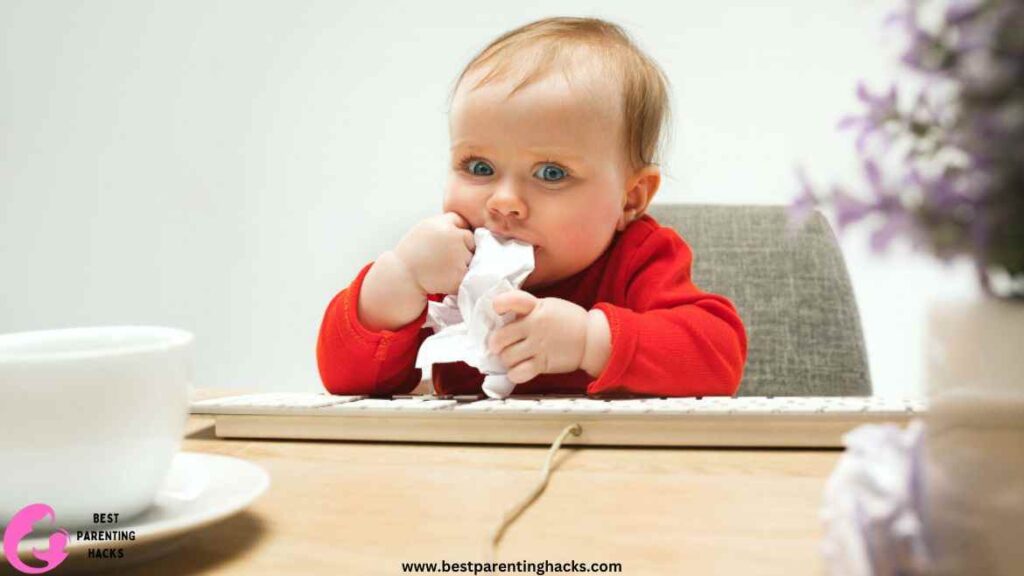
Personal Experience and Best Practices
From my own experience, getting beyond the mouthing period calls for a trifecta of awareness, comprehension, and ingenuity. I found out that I should be keen on observing my infants particularly when they are playing and changing diapers. Additionally, I discovered the importance of providing safe alternatives like infants’ teething toys that can be chewed on. Sharing experiences with other parents has been a good thing to do on both online and offline forums. I’ve learned several tricks like making my cloth wipes and clearing out little or potentially hazardous items from a designated play area. It’s also critical to remain up to date on the most recent guidelines for kid safety and to seek the opinion of physicians for specific recommendations.

Conclusion
In sum, infants’ application of their tongues to explore the environment is normal but we must take care of them as parents. Because of their chemical composition and physical characteristics, baby wipes are not suitable for chewing, notwithstanding their convenience. Through comprehension of the hazards, consulting professionals, and investigating less hazardous options, we may successfully maneuver through this stage. Equally important is the adoption of prevention measures as well as the sharing of best practices among parents. To create an enabling atmosphere that promotes growth and exploration, for our children.
FAQs
1. What should I do if my baby chews on a baby wipe?
• Take the wipeout of their mouth right away and give them water to rinse it off. If you see any indications of discomfort stay alert. Reach out to a professional.
2. Can gnawing on baby wipes have long-term negative effects?
• Regular consumption of the chemicals in baby wipes can be dangerous, even while infrequent exposure is unlikely to result in long-term harm. It is preferable to stop this conduct.
3. Are there any wipes for babies that are safe to gnaw on?
• Baby wipes are not meant to be chewed on. Even natural wipes are to be avoided getting in a baby’s mouth.
4. How can I determine whether my child has a baby wipe allergy?
• Skin irritation, rashes, or redness are indications of an allergic response. Consult a doctor and discontinue using the wipes if you have any symptoms.
5. Which teething toys are the greatest to keep my kid from gnawing on wipes?
• Safe, non-toxic materials like silicone or natural rubber are excellent for making teething toys that also keep babies busy and relieve sore gums.
6. Is it typical for infants to gnaw on everything?
• Indeed, it’s a typical stage of their growth. Babies explore their surroundings using all their senses, including the sense of taste.
7. How can I manufacture baby wipes at home?
• Soft, clean cloths may be used to make homemade baby wipes by chopping them up and soaking them in a mixture of water, a gentle cleaner, and a safe oil such as coconut oil.

